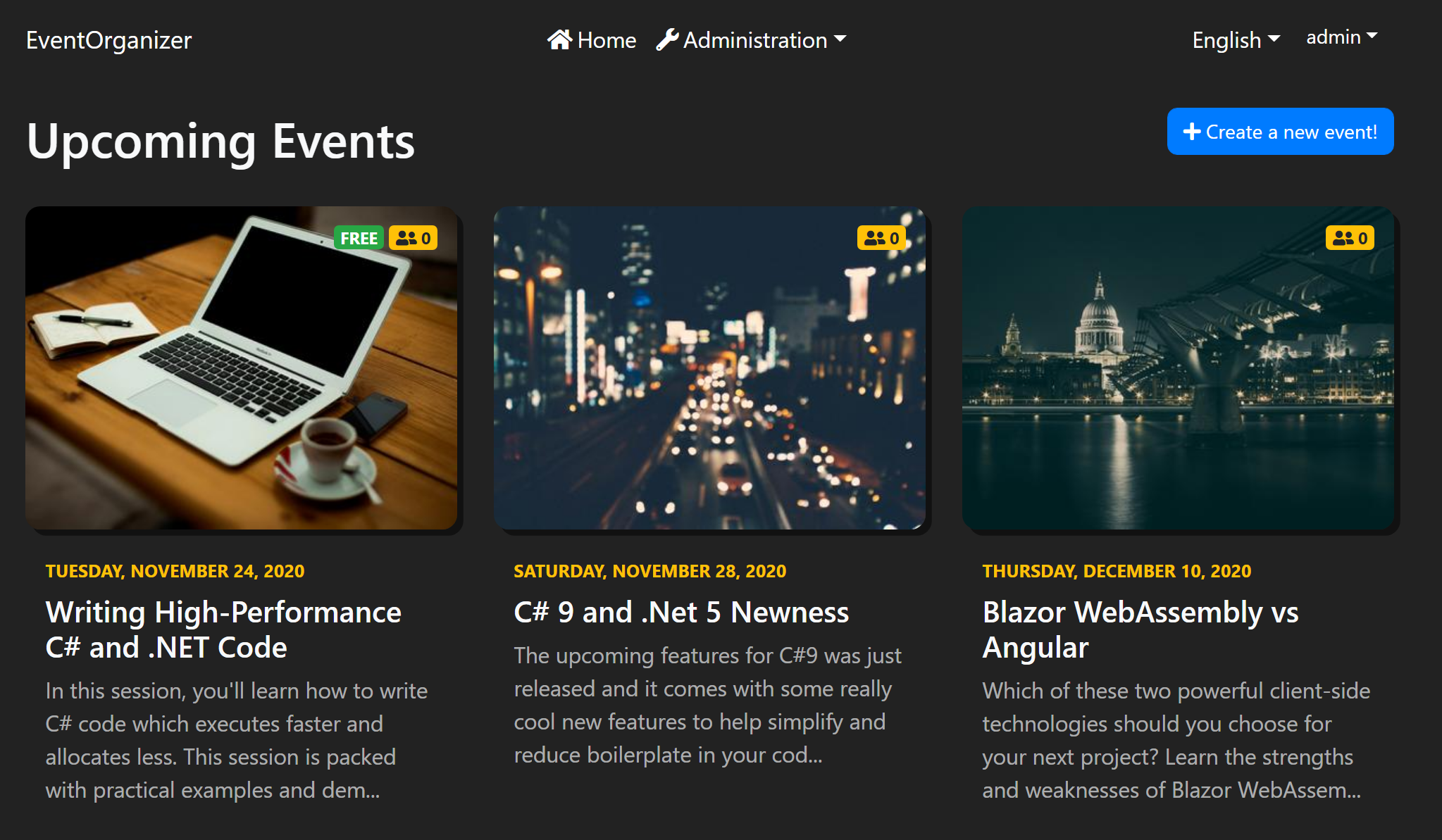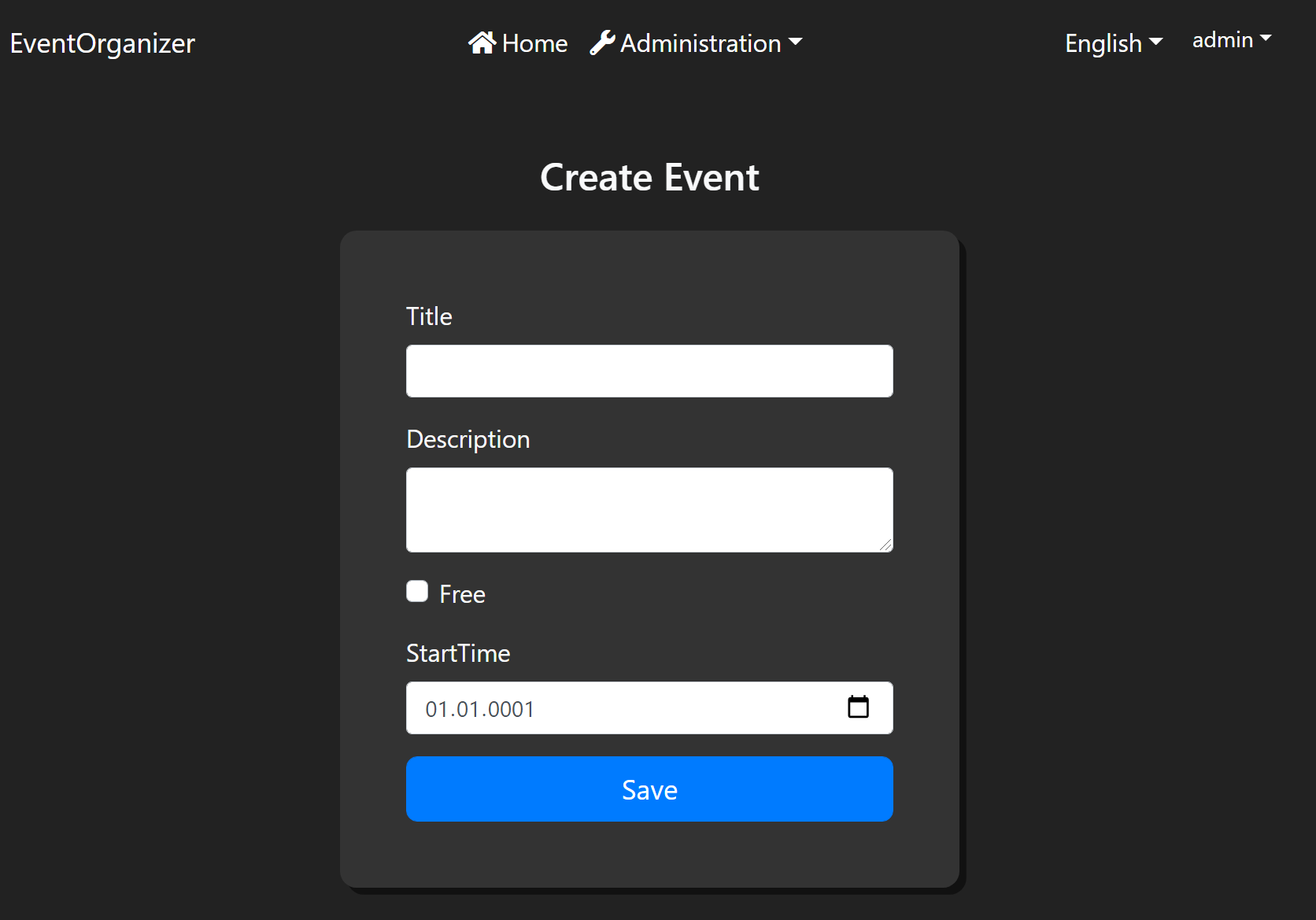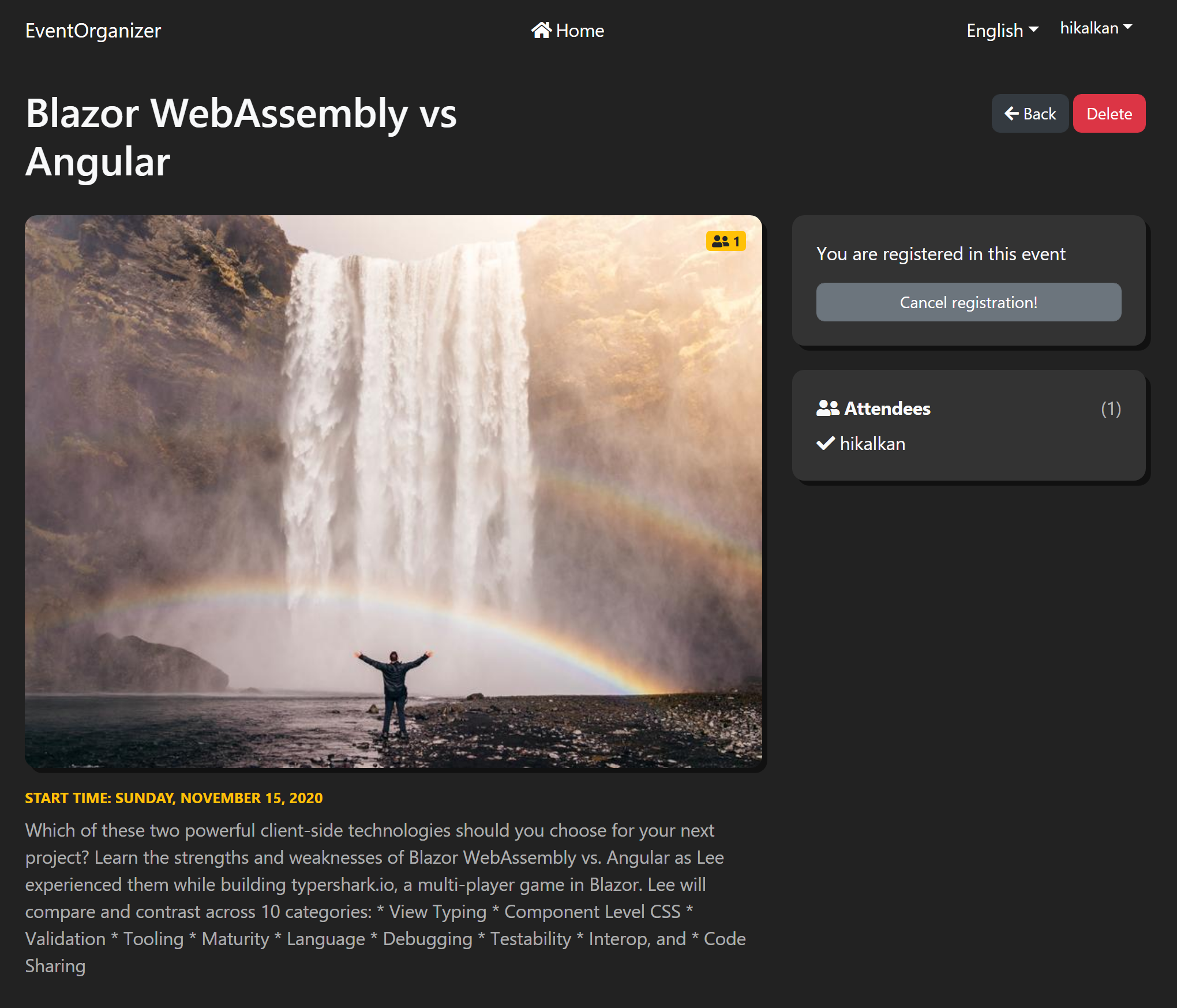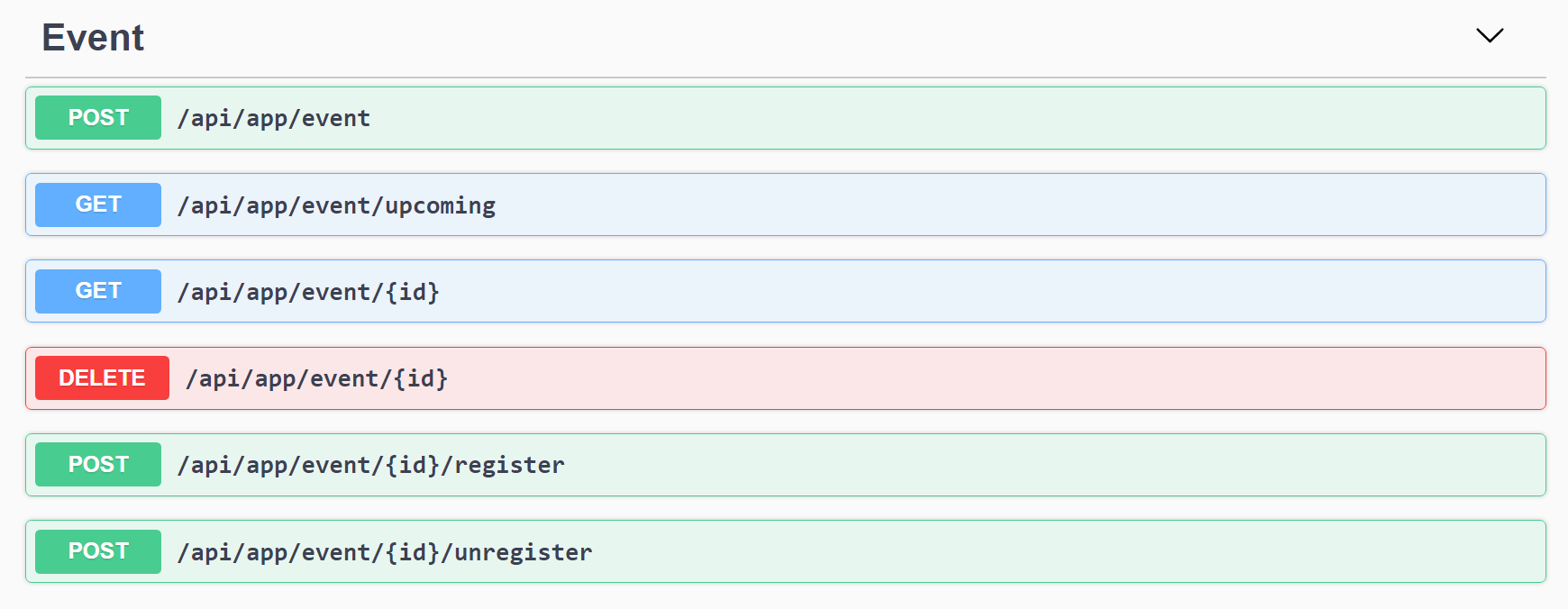Creating an Event Organizer Application with the Blazor UI
Introduction
In this article, we will create an example application that is a simple meeting/event organizer: People create events and other people registers to the event.
The application has been developed with Blazor as the UI framework and MongoDB as the database provider.
This tutorial is based on my notes that I'd created to implement this application in a workshop. It shows the necessary steps to build the application rather than detailed explanations.
Source Code
Source code of the completed application is available on GitHub.
Screenshots
Here, the pages of the final application.
Home Page - Event List

Creating a new Event

Event Detail Page

Requirements
The following tools are needed to be able to run the solution.
- .NET 5.0 SDK
- Visual Studio 2019 16.8.0+ or another compatible IDE
- MongoDB Server (with MongoDB Compass)
Development
Creating a new Application
- Use the following ABP CLI command:
abp new EventOrganizer -u blazor -d mongodb
Open & Run the Application
- Open the solution in Visual Studio (or your favorite IDE).
- Run the
EventOrganizer.DbMigratorapplication to seed the initial data. - Run the
EventOrganizer.HttpApi.Hostapplication that starts the server side. - Run the
EventOrganizer.Blazorapplication to start the UI.
Apply the Custom Styles
- Add styles to
wwwroot/main.css:
body.abp-application-layout {
background-color: #222 !important;
font-size: 18px;
}
nav#main-navbar.bg-dark {
background-color: #222 !important;
box-shadow: none !important;
}
.event-pic {
width: 100%;
border-radius: 12px;
box-shadow: 5px 5px 0px 0px rgba(0,0,0,.5);
margin-bottom: 10px;
}
.event-link:hover, .event-link:hover *{
text-decoration: none;
}
.event-link:hover .event-pic {
box-shadow: 5px 5px 0px 0px #ffd800;
}
.event-form {
background-color: #333 !important;
box-shadow: 5px 5px 0px 0px rgba(0,0,0,.5);
border-radius: 12px;
}
.table {
background: #fff;
border-radius: 12px;
box-shadow: 5px 5px 0px 0px rgba(0,0,0,.5);
}
.table th{
border: 0 !important;
}
.modal {
color: #333;
}
.page-item:first-child .page-link {
margin-left: 0;
border-top-left-radius: 12px;
border-bottom-left-radius: 12px;
}
.page-item:last-child .page-link {
border-top-right-radius: 12px;
border-bottom-right-radius: 12px;
}
.btn {
border-radius: 8px;
}
.att-list {
list-style: none;
padding: 0;
}
.att-list li {
padding: 4px 0 0 0;
}
wwwroot/index.html: Removebg-lightclass from thebodytag and addbg-dark text-light.
Domain Layer
- Add the following
Eventaggregate (withEventAttendee) to the solution:
Event
using System;
using System.Collections.Generic;
using Volo.Abp.Domain.Entities.Auditing;
namespace EventOrganizer.Events
{
public class Event : FullAuditedAggregateRoot<Guid>
{
public string Title { get; set; }
public string Description { get; set; }
public bool IsFree { get; set; }
public DateTime StartTime { get; set; }
public ICollection<EventAttendee> Attendees { get; set; }
public Event()
{
Attendees = new List<EventAttendee>();
}
}
}
EventAttendee
using System;
using Volo.Abp.Auditing;
namespace EventOrganizer.Events
{
public class EventAttendee : IHasCreationTime
{
public Guid UserId { get; set; }
public DateTime CreationTime { get; set; }
}
}
MongoDB Mapping
- Add the following property to the
EventOrganizerMongoDbContext:
public IMongoCollection<Event> Events => Collection<Event>();
Clean Index.razor & Add the Header & "Create Event" button
- Clean the
Index.razorfile. - Replace the content with the following code:
@page "/"
@inherits EventOrganizerComponentBase
<Row Class="mb-4">
<Column Class="text-left">
<h1>Upcoming Events</h1>
</Column>
<Column Class="text-right">
@if (CurrentUser.IsAuthenticated)
{
<a class="btn btn-primary" href="/create-event">
<i class="fa fa-plus"></i> @L["CreateEvent"]
</a>
}
</Column>
</Row>
- Open
Localization/EventOrganizer/en.jsonin theEventOrganizer.Domain.Sharedproject and add the following entry:
"CreateEvent": "Create a new event!"
The Result (run the EventOrganizer.Blazor application to see):

Event Creation
- Create the Initial
IEventAppServicewith theCreateAsyncmethod:
using System;
using System.Threading.Tasks;
using Volo.Abp.Application.Services;
namespace EventOrganizer.Events
{
public interface IEventAppService : IApplicationService
{
Task<Guid> CreateAsync(EventCreationDto input);
}
}
- Add
EventCreationDtoclass:
using System;
using System.ComponentModel.DataAnnotations;
namespace EventOrganizer.Events
{
public class EventCreationDto
{
[Required]
[StringLength(100)]
public string Title { get; set; }
[Required]
[StringLength(2000)]
public string Description { get; set; }
public bool IsFree { get; set; }
public DateTime StartTime { get; set; }
}
}
- Implement the
EventAppService:
using System;
using System.Threading.Tasks;
using Microsoft.AspNetCore.Authorization;
using Volo.Abp.Domain.Repositories;
namespace EventOrganizer.Events
{
public class EventAppService : EventOrganizerAppService, IEventAppService
{
private readonly IRepository<Event, Guid> _eventRepository;
public EventAppService(IRepository<Event, Guid> eventRepository)
{
_eventRepository = eventRepository;
}
[Authorize]
public async Task<Guid> CreateAsync(EventCreationDto input)
{
var eventEntity = ObjectMapper.Map<EventCreationDto, Event>(input);
await _eventRepository.InsertAsync(eventEntity);
return eventEntity.Id;
}
}
}
- Add AutoMapper mapping to the
EventOrganizerApplicationAutoMapperProfileclass:
using AutoMapper;
using EventOrganizer.Events;
namespace EventOrganizer
{
public class EventOrganizerApplicationAutoMapperProfile : Profile
{
public EventOrganizerApplicationAutoMapperProfile()
{
CreateMap<EventCreationDto, Event>();
}
}
}
This will automatically create the HTTP (REST) API for the application service (run the EventOrganizer.HttpApi.Host application to see it on the Swagger UI):

- Create the
CreateEvent.razorfile:
@page "/create-event"
@inherits EventOrganizerComponentBase
<Heading Size="HeadingSize.Is3" Margin="Margin.Is5.FromTop.Is4.FromBottom" Class="text-center">Create Event</Heading>
<Row>
<Column ColumnSize="ColumnSize.Is6.Is3.WithOffset">
<div class="p-lg-5 p-md-3 event-form">
<EditForm Model="@Event" OnValidSubmit="Create">
<Field>
<FieldLabel>@L["Title"]</FieldLabel>
<TextEdit @bind-Text="@Event.Title" />
</Field>
<Field>
<FieldLabel>@L["Description"]</FieldLabel>
<MemoEdit @bind-Text="@Event.Description" />
</Field>
<Field>
<Check TValue="bool" @bind-Checked="@Event.IsFree">@L["Free"]</Check>
</Field>
<Field>
<FieldLabel>@L["StartTime"]</FieldLabel>
<DateEdit TValue="DateTime" @bind-Date="@Event.StartTime" />
</Field>
<Button Type="@ButtonType.Submit" Block="true" Color="@Color.Primary" Size="Size.Large">@L["Save"]</Button>
</EditForm>
</div>
</Column>
</Row>
- Create a partial
CreateEventclass in the same folder, with theCreateEvent.razor.csas the file name:
using System.Threading.Tasks;
using EventOrganizer.Events;
using Microsoft.AspNetCore.Components;
namespace EventOrganizer.Blazor.Pages
{
public partial class CreateEvent
{
private EventCreationDto Event { get; set; } = new EventCreationDto();
private readonly IEventAppService _eventAppService;
private readonly NavigationManager _navigationManager;
public CreateEvent(
IEventAppService eventAppService,
NavigationManager navigationManager)
{
_eventAppService = eventAppService;
_navigationManager = navigationManager;
}
private async Task Create()
{
var eventId = await _eventAppService.CreateAsync(Event);
_navigationManager.NavigateTo("/events/" + eventId);
}
}
}
The final UI is (run the EventOrganizer.Blazor application and click to the "Create Event" button):

Upcoming Events (Home Page)
- Open the
IEventAppServiceand add aGetUpcomingAsyncmethod to get the list of upcoming events:
using System;
using System.Collections.Generic;
using System.Threading.Tasks;
using Volo.Abp.Application.Services;
namespace EventOrganizer.Events
{
public interface IEventAppService : IApplicationService
{
Task<Guid> CreateAsync(EventCreationDto input);
Task<List<EventDto>> GetUpcomingAsync();
}
}
- Add a
EventDtoclass:
using System;
using Volo.Abp.Application.Dtos;
namespace EventOrganizer.Events
{
public class EventDto : EntityDto<Guid>
{
public string Title { get; set; }
public string Description { get; set; }
public bool IsFree { get; set; }
public DateTime StartTime { get; set; }
public int AttendeesCount { get; set; }
}
}
- Implement the
GetUpcomingAsyncin theEventAppServiceclass:
using System;
using System.Collections.Generic;
using System.Linq;
using System.Threading.Tasks;
using Microsoft.AspNetCore.Authorization;
using Volo.Abp.Domain.Repositories;
namespace EventOrganizer.Events
{
public class EventAppService : EventOrganizerAppService, IEventAppService
{
private readonly IRepository<Event, Guid> _eventRepository;
public EventAppService(IRepository<Event, Guid> eventRepository)
{
_eventRepository = eventRepository;
}
[Authorize]
public async Task<Guid> CreateAsync(EventCreationDto input)
{
var eventEntity = ObjectMapper.Map<EventCreationDto, Event>(input);
await _eventRepository.InsertAsync(eventEntity);
return eventEntity.Id;
}
public async Task<List<EventDto>> GetUpcomingAsync()
{
var queryable = await _eventRepository.GetQueryableAsync();
var query = queryable
.Where(x => x.StartTime > Clock.Now)
.OrderBy(x => x.StartTime);
var events = await AsyncExecuter.ToListAsync(query);
return ObjectMapper.Map<List<Event>, List<EventDto>>(events);
}
}
}
- Add the following line into the
EventOrganizerApplicationAutoMapperProfileconstructor:
CreateMap<Event, EventDto>();
Run the EventOrganizer.HttpApi.Host application to see the new upcoming endpoint on the Swagger UI:

- Change the
Pages/Index.razor.cscontent in theEventOrganizer.Blazorproject as shown below:
using System.Collections.Generic;
using System.Threading.Tasks;
using EventOrganizer.Events;
namespace EventOrganizer.Blazor.Pages
{
public partial class Index
{
private List<EventDto> UpcomingEvents { get; set; } = new List<EventDto>();
private readonly IEventAppService _eventAppService;
public Index(IEventAppService eventAppService)
{
_eventAppService = eventAppService;
}
protected override async Task OnInitializedAsync()
{
UpcomingEvents = await _eventAppService.GetUpcomingAsync();
}
}
}
- Change the
Pages/Index.razorcontent in theEventOrganizer.Blazorproject as shown below:
@page "/"
@inherits EventOrganizerComponentBase
<Row Class="mb-4">
<Column Class="text-left">
<h1>Upcoming Events</h1>
</Column>
<Column Class="text-right">
@if (CurrentUser.IsAuthenticated)
{
<a class="btn btn-primary" href="/create-event">
<i class="fa fa-plus"></i> @L["CreateEvent"]
</a>
}
</Column>
</Row>
<Row>
@foreach (var upcomingEvent in UpcomingEvents)
{
<Column Class="col-12 col-lg-4 col-md-6">
<a class="mb-5 position-relative d-block event-link" href="/events/@upcomingEvent.Id">
<div class="position-absolute text-right w-100 px-3 py-2" style="left: 0; top: 2px;">
@if (upcomingEvent.IsFree)
{
<Badge Color="Color.Success" Class="mr-1">FREE</Badge>
}
<span class="badge badge-warning font-weight-normal">
<i class="fas fa-user-friends"></i>
<span class="font-weight-bold">@upcomingEvent.AttendeesCount</span>
</span>
</div>
<img src="https://picsum.photos/seed/@upcomingEvent.Id/400/300" class="event-pic"/>
<div class="px-3 py-1">
<small class="font-weight-bold text-warning my-2 d-block text-uppercase">@upcomingEvent.StartTime.ToLongDateString()</small>
<p class="h4 text-light d-block mb-2">@upcomingEvent.Title</p>
<p class="text-light" style="opacity: .65;">@upcomingEvent.Description.TruncateWithPostfix(150)</p>
</div>
</a>
</Column>
}
</Row>
The new home page is shown below:

Event Detail Page
- Add
GetAsync,RegisterAsync,UnregisterAsyncandDeleteAsyncmethods to theIEventAppService:
using System;
using System.Collections.Generic;
using System.Threading.Tasks;
using Volo.Abp.Application.Services;
namespace EventOrganizer.Events
{
public interface IEventAppService : IApplicationService
{
Task<Guid> CreateAsync(EventCreationDto input);
Task<List<EventDto>> GetUpcomingAsync();
Task<EventDetailDto> GetAsync(Guid id);
Task RegisterAsync(Guid id);
Task UnregisterAsync(Guid id);
Task DeleteAsync(Guid id);
}
}
- Add
EventDetailDtoclass:
using System;
using System.Collections.Generic;
using Volo.Abp.Application.Dtos;
namespace EventOrganizer.Events
{
public class EventDetailDto : CreationAuditedEntityDto<Guid>
{
public string Title { get; set; }
public string Description { get; set; }
public bool IsFree { get; set; }
public DateTime StartTime { get; set; }
public List<EventAttendeeDto> Attendees { get; set; }
}
}
- Add
EventAttendeeDtoclass:
using System;
namespace EventOrganizer.Events
{
public class EventAttendeeDto
{
public Guid UserId { get; set; }
public string UserName { get; set; }
public DateTime CreationTime { get; set; }
}
}
- Implement the new methods in the
EventAppService:
using System;
using System.Collections.Generic;
using System.Linq;
using System.Threading.Tasks;
using EventOrganizer.Users;
using Microsoft.AspNetCore.Authorization;
using Volo.Abp;
using Volo.Abp.Domain.Repositories;
using Volo.Abp.Users;
namespace EventOrganizer.Events
{
public class EventAppService : EventOrganizerAppService, IEventAppService
{
private readonly IRepository<Event, Guid> _eventRepository;
private readonly IRepository<AppUser, Guid> _userRepository;
public EventAppService(IRepository<Event, Guid> eventRepository, IRepository<AppUser, Guid> userRepository)
{
_eventRepository = eventRepository;
_userRepository = userRepository;
}
[Authorize]
public async Task<Guid> CreateAsync(EventCreationDto input)
{
var eventEntity = ObjectMapper.Map<EventCreationDto, Event>(input);
await _eventRepository.InsertAsync(eventEntity);
return eventEntity.Id;
}
public async Task<List<EventDto>> GetUpcomingAsync()
{
var queryable = await _eventRepository.GetQueryableAsync();
var query = queryable
.Where(x => x.StartTime > Clock.Now)
.OrderBy(x => x.StartTime);
var events = await AsyncExecuter.ToListAsync(query);
return ObjectMapper.Map<List<Event>, List<EventDto>>(events);
}
public async Task<EventDetailDto> GetAsync(Guid id)
{
var @event = await _eventRepository.GetAsync(id);
var attendeeIds = @event.Attendees.Select(a => a.UserId).ToList();
var queryable = await _userRepository.GetQueryableAsync();
var query = queryable
.Where(u => attendeeIds.Contains(u.Id));
var attendees = (await AsyncExecuter.ToListAsync(query))
.ToDictionary(x => x.Id);
var result = ObjectMapper.Map<Event, EventDetailDto>(@event);
foreach (var attendeeDto in result.Attendees)
{
attendeeDto.UserName = attendees[attendeeDto.UserId].UserName;
}
return result;
}
[Authorize]
public async Task RegisterAsync(Guid id)
{
var @event = await _eventRepository.GetAsync(id);
if (@event.Attendees.Any(a => a.UserId == CurrentUser.Id))
{
return;
}
@event.Attendees.Add(new EventAttendee {UserId = CurrentUser.GetId(), CreationTime = Clock.Now});
await _eventRepository.UpdateAsync(@event);
}
[Authorize]
public async Task UnregisterAsync(Guid id)
{
var @event = await _eventRepository.GetAsync(id);
var removedItems = @event.Attendees.RemoveAll(x => x.UserId == CurrentUser.Id);
if (removedItems.Any())
{
await _eventRepository.UpdateAsync(@event);
}
}
[Authorize]
public async Task DeleteAsync(Guid id)
{
var @event = await _eventRepository.GetAsync(id);
if (CurrentUser.Id != @event.CreatorId)
{
throw new UserFriendlyException("You don't have the necessary permission to delete this event!");
}
await _eventRepository.DeleteAsync(id);
}
}
}
- Add the following mappings into the
EventOrganizerApplicationAutoMapperProfile:
CreateMap<Event, EventDetailDto>();
CreateMap<EventAttendee, EventAttendeeDto>();
Run the EventOrganizer.HttpApi.Host application to see the complete Event HTTP API in the Swagger UI:

- Create
EventDetail.razorcomponent with the following content:
@page "/events/{id}"
@inherits EventOrganizerComponentBase
@if (Event != null)
{
<Row Class="mb-4">
<Column Class="text-left">
<h1>@Event.Title</h1>
</Column>
<Column Class="text-right pt-2">
<a href="/" Class="btn btn-dark"><i class="fa fa-arrow-left"></i> Back</a>
@if (CurrentUser.IsAuthenticated && CurrentUser.Id == Event.CreatorId)
{
<Button Color="Color.Danger" Clicked="Delete" Class="ml-1">Delete</Button>
}
</Column>
</Row>
<Row>
<Column Class="col-12 col-md-8">
<div class="position-relative">
<div class="position-absolute text-right w-100 px-3 py-2" style="left: 0; top: 2px;">
@if (Event.IsFree)
{
<Badge Color="Color.Success" Class="mr-1">FREE</Badge>
}
<span class="badge badge-warning font-weight-normal">
<i class="fas fa-user-friends"></i>
<span class="font-weight-bold">@Event.Attendees.Count</span>
</span>
</div>
<img src="https://picsum.photos/seed/@Event.Id/800/600" class="event-pic" />
<small class="font-weight-bold text-warning my-2 d-block text-uppercase">Start time: @Event.StartTime.ToLongDateString()</small>
<p style="opacity: .65;">@Event.Description</p>
</div>
</Column>
<Column Class="col-12 col-md-4">
<div class="p-4 event-form">
@if (CurrentUser.IsAuthenticated)
{
<div>
@if (!IsRegistered)
{
<Button Color="Color.Primary" Clicked="Register" Class="btn-block btn-lg">Register now!</Button>
}
else
{
<p>You are registered in this event</p>
<Button Color="Color.Secondary" Clicked="UnRegister" Class="btn-block">Cancel registration!</Button>
}
</div>
}
else
{
<a class="btn btn-primary" href="/authentication/login">
<i class="fa fa-sign-in-alt"></i> Login to attend!
</a>
}
</div>
<div class="mt-4 event-form p-4">
<span class="font-weight-bold"><i class="fas fa-user-friends"></i> Attendees <span class="float-right font-weight-normal" style="opacity:.65;">(@Event.Attendees.Count)</span></span>
<ul class="mt-1 mb-0 att-list">
@foreach (var attendee in Event.Attendees)
{
<li><i class="fa fa-check"></i> @attendee.UserName</li>
}
</ul>
</div>
</Column>
</Row>
}
- Create
EventDetail.razor.csfile with the following content:
using System;
using System.Linq;
using System.Threading.Tasks;
using EventOrganizer.Events;
using Microsoft.AspNetCore.Components;
namespace EventOrganizer.Blazor.Pages
{
public partial class EventDetail
{
[Parameter]
public string Id { get; set; }
private EventDetailDto Event { get; set; }
private bool IsRegistered { get; set; }
private readonly IEventAppService _eventAppService;
private readonly NavigationManager _navigationManager;
public EventDetail(
IEventAppService eventAppService,
NavigationManager navigationManager)
{
_eventAppService = eventAppService;
_navigationManager = navigationManager;
}
protected override async Task OnInitializedAsync()
{
await GetEventAsync();
}
private async Task GetEventAsync()
{
Event = await _eventAppService.GetAsync(Guid.Parse(Id));
if (CurrentUser.IsAuthenticated)
{
IsRegistered = Event.Attendees.Any(a => a.UserId == CurrentUser.Id);
}
}
private async Task Register()
{
await _eventAppService.RegisterAsync(Guid.Parse(Id));
await GetEventAsync();
}
private async Task UnRegister()
{
await _eventAppService.UnregisterAsync(Guid.Parse(Id));
await GetEventAsync();
}
private async Task Delete()
{
if (!await Message.Confirm("This event will be deleted: " + Event.Title))
{
return;
}
await _eventAppService.DeleteAsync(Guid.Parse(Id));
_navigationManager.NavigateTo("/");
}
}
}
The resulting page is shown below:

Integration Tests
Create an EventAppService_Tests class in the EventOrganizer.Application.Tests project:
using System;
using System.Threading.Tasks;
using Shouldly;
using Xunit;
namespace EventOrganizer.Events
{
[Collection(EventOrganizerTestConsts.CollectionDefinitionName)]
public class EventAppService_Tests : EventOrganizerApplicationTestBase
{
private readonly IEventAppService _eventAppService;
public EventAppService_Tests()
{
_eventAppService = GetRequiredService<IEventAppService>();
}
[Fact]
public async Task Should_Create_A_Valid_Event()
{
// Create an event
var eventId = await _eventAppService.CreateAsync(
new EventCreationDto
{
Title = "My test event 1",
Description = "My test event description 1",
IsFree = true,
StartTime = DateTime.Now.AddDays(2)
}
);
eventId.ShouldNotBe(Guid.Empty);
// Get the event
var @event = await _eventAppService.GetAsync(eventId);
@event.Title.ShouldBe("My test event 1");
// Get upcoming events
var events = await _eventAppService.GetUpcomingAsync();
events.ShouldContain(x => x.Title == "My test event 1");
}
}
}
Source Code
Source code of the completed application is available on GitHub.






























































Comments
No one has commented yet, be the first to comment!